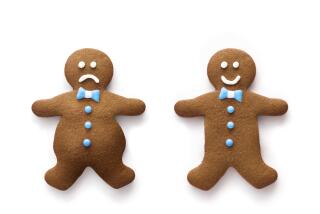Diet myth-busters: Experts burst some bubbles about losing weight
- Share via
Attention dieters: Many of the “facts” you think you know about obesity and weight loss are wrong.
So says a report published in Thursday’s edition of the New England Journal of Medicine. An international team of dietitians, doctors and other experts examined more than a dozen ideas about obesity that are widely believed to be true but aren’t actually supported by reliable medical evidence. It’s not just dieters who buy into these mistaken notions, the study authors note – much of this incorrect conventional wisdom is espoused by physicians, academic scientists, government agencies and (gulp) the media.
Seven of these errant ideas were classified as “myths,” meaning they are “beliefs held to be true despite substantial refuting evidence.” Another six were categorized as “presumptions,” or “beliefs held to be true for which convincing evidence does not yet confirm or disprove their truth.”
Without further ado, let’s get to the myth-busting:
Eating a little less or exercising a little more will lead to large weight loss over time, as long as those behaviors are sustained. This myth is based on the idea that 3,500 calories are equal to one pound. That equation was based on short-term experiments. In the long-term, the body compensates in various ways that slow down weight loss. For instance, the equation predicts that a person who burns 100 extra calories per day will lose more than 50 pounds over five years; in reality, that exercise regimen will cause a person to shed only about 10 pounds (assuming calorie intake remains the same).
It’s important to set realistic weight-loss goals so dieters don’t get frustrated. Studies that have examined this reasonable-sounding assumption have found that having realistic goals has no impact on the amount of weight lost. Indeed, some studies have found that those who set the most ambitious goals lost the most weight, even if they fell short of their initial expectations.
Slow, gradual weight loss is easier to sustain than large, rapid weight loss. In fact, clinical trials have found that people who jump-start their diets by dropping a lot of weight in the beginning (by consuming only 800 to 1,200 calories per day, for instance) had the best results in long-term studies.
In order to help someone lose weight, you must gauge their readiness to stick to a diet. Experimental evidence shows that readiness isn’t related to diet results.
School P.E. classes help reduce and prevent childhood obesity. While there is certainly some amount of physical education that would help fight childhood obesity, P.E. classes in their current form have not been shown to reduce BMI or obesity in kids on a consistent basis.
Babies who are breast-fed are less likely to become obese. If you think this is true, you’re in good company – the World Health Organization presented this “fact” in one of its reports. But a randomized, controlled clinical trial that followed 13,000 children for more than six years found “no compelling evidence” that breastfeeding staves off obesity, according to the New England Journal of Medicine report. (The authors did note that breastfeeding has other benefits and should be encouraged anyway.)
You can burn 100 to 300 calories by having sex. In fact, having sex burns calories at about the same rate as walking at a pace of 2.5 mph. “Given that the average bout of sexual activity lasts about 6 minutes,” the authors write, a man in his early to mid-30s might burn 21 calories. But wait, it gets worse: Considering that this man could burn 7 calories just watching TV, the true benefit of having sex is only 14 additional calories burned.
The report also says that these widely accepted ideas are just as likely to be false as true:
* Eating breakfast instead of skipping it will help prevent obesity.
* Long-term eating and exercise habits are set in early childhood.
* Regardless of what else you do, eating more fruits and vegetables will lead to weight loss (or less weight gain).
* Yo-yo dieting will take months or years off your life.
* Snacking will make you gain weight.
* The availability of sidewalks, parks and other aspects of the “built environment” influence the prevalence of obesity.
How’s that for a reality check? You can read the full article for yourself here.
Return to the Booster Shots blog.
Follow me on Twitter @LATkarenkaplan
More to Read
Sign up for Essential California
The most important California stories and recommendations in your inbox every morning.
You may occasionally receive promotional content from the Los Angeles Times.











